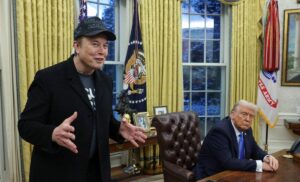Menu
- Daily
PSA Projects Negative Rice Inflation for Full Year 2025 as Prices Continue to Drop
Claire Dennis Mapa rice inflation, Department of Agriculture P20 rice, Featured, negative rice inflation, P20 rice program 2025, Philippine rice deflation, Philippines rice inflation 2025, PSA rice prices May 2025, regular well-milled special rice prices, rice import tariff impact, rice price drop PhilippinesJobless Filipinos Reach 2.06M in April 2025 Amid Growing Labor Force – PSA
employment rate April 2025, Featured, high-quality job creation PH, jobless Filipinos statistics, PH labor force growth, Philippine economy labor update, Philippines unemployment April 2025, PSA labor force survey 2025, sectors with job gains 2025, Trabaho Para sa Bayan Plan 2025, underemployment PSA AprilTrump Slams Musk Over Tax-Cut Bill Opposition, Says “Very Disappointed”
Donald Trump Big Beautiful Bill, Elon Musk leaves Trump admin, Elon Musk tax-cut bill criticism, Featured, Government Efficiency Department Musk, Musk federal deficit concerns, Tesla stock drop Trump, Trump disappointed in Elon Musk, Trump EV credit removal, Trump Musk feud 2025, Trump vs Musk latest news - National
Business Groups Warn of Inflation, Job Cuts Over Proposed ₱200 Wage Hike
₱200 daily wage increase, business groups on wage increase, ECOP Sergio Ortiz-Luis wage bill, Featured, inflation effects wage legislation, job loss risk wage hike, Makati Business Club wage impact, minimum wage inflation risk, PCCI ECOP MBC wage warning, Philippines wage hike 2025, regional wage boards PhilippinesPSA Projects Negative Rice Inflation for Full Year 2025 as Prices Continue to Drop
Claire Dennis Mapa rice inflation, Department of Agriculture P20 rice, Featured, negative rice inflation, P20 rice program 2025, Philippine rice deflation, Philippines rice inflation 2025, PSA rice prices May 2025, regular well-milled special rice prices, rice import tariff impact, rice price drop PhilippinesJobless Filipinos Reach 2.06M in April 2025 Amid Growing Labor Force – PSA
employment rate April 2025, Featured, high-quality job creation PH, jobless Filipinos statistics, PH labor force growth, Philippine economy labor update, Philippines unemployment April 2025, PSA labor force survey 2025, sectors with job gains 2025, Trabaho Para sa Bayan Plan 2025, underemployment PSA April - International
Trump Slams Musk Over Tax-Cut Bill Opposition, Says “Very Disappointed”
Donald Trump Big Beautiful Bill, Elon Musk leaves Trump admin, Elon Musk tax-cut bill criticism, Featured, Government Efficiency Department Musk, Musk federal deficit concerns, Tesla stock drop Trump, Trump disappointed in Elon Musk, Trump EV credit removal, Trump Musk feud 2025, Trump vs Musk latest newsHotel101 to Develop 10,000 Affordable Rooms in Saudi Arabia Under $2.5B Expansion Deal
affordable hotel chain Saudi Arabia, DoubleDragon hotel project, DoubleDragon Nasdaq listing, Edgar Injap Sia II Hotel101, Featured, global condotel model, Hannah Yulo-Luccini, Hotel101 Horizon Group partnership, Hotel101 Medina Riyadh Jeddah, Hotel101 Saudi Arabia expansion, Vision 2030 tourism Saudi - Editorial
- Next Negosyante
- Crypto News





















Comments are closed for this article!